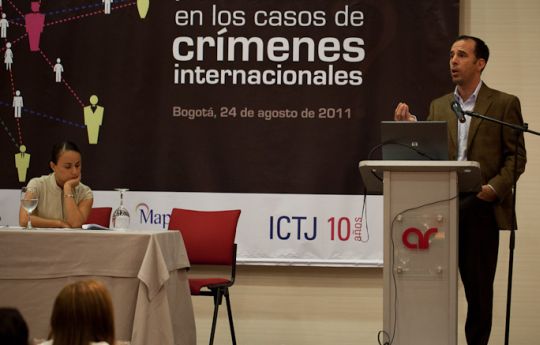Argentina, surpassing expectations with a growing capacity

The panel on selection and prioritization in the prosecutions of international crimes in Guatemala and Argentina was presented by Lisandro Pellegrini, advisor to the General Prosecutor in Argentina, and María José Ortiz, legal officer with CICIG in Guatemala.
Prof. Pellegrini presented the evolution of the process of prosecuting and trying the crimes committed during the Argentinean dictatorship. Pellegrini noted that in the beginning of what he referred to as the second phase of prosecutions, beginning in 2001, the operators of the judicial system in general believed the challenge of processing the massive quantity of violations and accused persons to be beyond its capabilities. “The initial feeling, as recent as 2005, was one of being completely perplexed. ‘We´re not going to be able to do this, we don’t have the capacity,’ that’s what we were thinking,” Pellegrini remembered.
He highlighed that “it is worth clarifying that a defining characteristic of the Argentinean experience is that the courts have resolved many more cases than which they initially believed themselves to be capable.”
Today, there are nearly 900 judicial proceedings open and there have been almost 250 convictions to date. The cases have become increasingly complex; in part a reflection of the increased capacity of the system. Next week will see one of the largest cases to date, involving some 300 allegations of crimes and 50 defendants.
Pellegrini also emphasized the role of the principle of legality in the Argentinean domestic legal order, a highly relevant characteristic shared with the Colombian context. In the 1980's, Argentina applied case selection as a prosecution strategy. This had a number of issues, including inappropriate interference by the executive branch in the work of the judiciary. “Nowadays, Argentina prosecutes all of the accused whose cases can be properly proven, and applies prioritization criteria", he said.
Guatemala, prosecuting organized crime in a context of a compromised judicial system
María José Ortiz presented the criteria for selection and prioritization adopted by CICIG in its task of investigating and advancing the prosecution of organized crime. Ortiz made the point that is especially relevant to consider CICIG for comparative purposes – Ortiz reiterated that cases that are not assumed by CICIG, for whatever reason, remain the competency of the Guatemalan state.
Ortiz explained that when CICIG began its mandate, the criteria it used to assume work on a particular case was the credibility of the source that was bringing the case to CICIG’s attention. Beyond this criterion, CICIG assumed cases as they arose.
The intervention of CICIG responded in large part to the infiltration of organized criminal structures into the Guatemalan justice system. A reflection of the degree of cooptation is the creation of the “querellante adhesivo.” This is a legal concept that gives standing to another party when the prosecutor declines to pursue a criminal allegation; under this figure the victim may motion directly to the judge and request judicial review of the decision not to prosecute.
Some of the key selection criteria that CICIG employs are:
- Factibility, or the probability of being able to gather pertinent information
- Necessity, generated in those cases where the state is not conducting the investigation
- Viability, the possibility to investigate, in light of time constraints and resource limitations
- Didactic worth, or the potential for establishing best practices for investigation and prosecution, or making contributions to the jurisprudence.
Overall factors are also considered given the objective of making lasting contributions to the domestic system and the dismantling of criminal structures to guarantee that violence and corruption are halted and never repeated.
Photos by Camilo Aldana
Video by Mauricio Cardona
